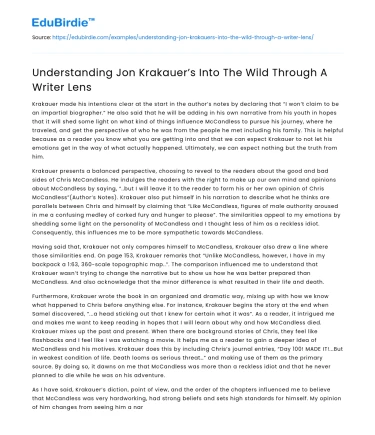Krakauer made his intentions clear at the start in the author’s notes by declaring that “I won’t claim to be an impartial biographer.” He also said that he will be adding in his own narrative from his youth in hopes that it will shed some light on what kind of things influence McCandless to pursue his journey, where he traveled, and get the perspective of who he was from the people he met including his family. This is helpful because as a reader you know what you are getting into and that we can expect Krakauer to not let his emotions get in the way of what actually happened. Ultimately, we can expect nothing but the truth from him.
Krakauer presents a balanced perspective, choosing to reveal to the readers about the good and bad sides of Chris McCandless. He indulges the readers with the right to make up our own mind and opinions about McCandless by saying, “..but I will leave it to the reader to form his or her own opinion of Chris McCandless”(Author’s Notes). Krakauer also put himself in his narration to describe what he thinks are parallels between Chris and himself by claiming that “Like McCandless, figures of male authority aroused in me a confusing medley of corked fury and hunger to please”. The similarities appeal to my emotions by shedding some light on the personality of McCandless and I thought less of him as a reckless idiot. Consequently, this influences me to be more sympathetic towards McCandless.
Save your time!
We can take care of your essay
- Proper editing and formatting
- Free revision, title page, and bibliography
- Flexible prices and money-back guarantee
Having said that, Krakauer not only compares himself to McCandless, Krakauer also drew a line where those similarities end. On page 153, Krakauer remarks that “Unlike McCandless, however, I have in my backpack a 1:63, 360-scale topographic map..”. The comparison influenced me to understand that Krakauer wasn’t trying to change the narrative but to show us how he was better prepared than McCandless. And also acknowledge that the minor difference is what resulted in their life and death.
Furthermore, Krakauer wrote the book in an organized and dramatic way, mixing up with how we know what happened to Chris before anything else. For instance, Krakauer begins the story at the end when Samel discovered, “...a head sticking out that I knew for certain what it was”. As a reader, it intrigued me and makes me want to keep reading in hopes that I will learn about why and how McCandless died. Krakauer mixes up the past and present. When there are background stories of Chris, they feel like flashbacks and I feel like I was watching a movie. It helps me as a reader to gain a deeper idea of McCandless and his motives. Krakauer does this by including Chris’s journal entries, “Day 100! MADE IT!...But in weakest condition of life. Death looms as serious threat…” and making use of them as the primary source. By doing so, it dawns on me that McCandless was more than a reckless idiot and that he never planned to die while he was on his adventure.
As I have said, Krakauer’s diction, point of view, and the order of the chapters influenced me to believe that McCandless was very hardworking, had strong beliefs and sets high standards for himself. My opinion of him changes from seeing him a narcissist and a reckless idiot to viewing him like Hamlet, who did too much thinking trying to make sense of the world. His overly extravagant independent nature and his life story cause him to walk into the wild. Ultimately Krakauer, in the end, made me understand that McCandless was a human being who saw joy not only in human relationships but also in everything and anything we might experience. And that we don’t have to engage in a habitual lifestyle.






 Stuck on your essay?
Stuck on your essay?

